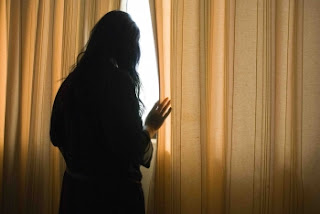Fear of public/crowded spaces
Occurring in 2% people of the world, it stands 10th in the top 10 phobias according to the "knowledge" magazine by BBC
 Agoraphobia usually develops as a complication of panic disorder, an anxiety disorder involving panic attacks and moments of intense fear. It can arise by associating panic attacks with the places or situations where they occurred and then avoiding them.
Agoraphobia usually develops as a complication of panic disorder, an anxiety disorder involving panic attacks and moments of intense fear. It can arise by associating panic attacks with the places or situations where they occurred and then avoiding them.
A minority of people with agoraphobia have no history of panic attacks. In these cases, their fear may be related to issues like a fear of crime, terrorism, illness, or being in an accident.
Traumatic events, such as bereavement, may contribute towards agoraphobia, as well as certain genes inherited from your parents.
In addition, you may have signs and symptoms of a panic attack, such as:
Fear of another panic attack can lead to avoiding similar circumstances or the place where it occurred in an attempt to prevent future panic attacks.
Occurring in 2% people of the world, it stands 10th in the top 10 phobias according to the "knowledge" magazine by BBC
Causes
 Agoraphobia usually develops as a complication of panic disorder, an anxiety disorder involving panic attacks and moments of intense fear. It can arise by associating panic attacks with the places or situations where they occurred and then avoiding them.
Agoraphobia usually develops as a complication of panic disorder, an anxiety disorder involving panic attacks and moments of intense fear. It can arise by associating panic attacks with the places or situations where they occurred and then avoiding them.A minority of people with agoraphobia have no history of panic attacks. In these cases, their fear may be related to issues like a fear of crime, terrorism, illness, or being in an accident.
Traumatic events, such as bereavement, may contribute towards agoraphobia, as well as certain genes inherited from your parents.
Symptoms
Typical agoraphobia symptoms include:- Fear of being alone in any situation
- Fear of being in crowded places
- Fear of losing control in a public place
- Fear of being in places where it may be hard to leave, such as an elevator or train
- Inability to leave your home (housebound) or only able to leave it if someone else goes with you
- Sense of helplessness
- Overdependence on others

- Rapid heart rate
- Excessive sweating
- Trouble breathing
- Feeling shaky, numb or tingling
- Chest pain or pressure
- Lightheadedness or dizziness
- Sudden flushing or chills
- Upset stomach or diarrhea
- Feeling a loss of control
- Fear of dying
Panic disorder and agoraphobia
Some people have a panic disorder in addition to agoraphobia. Panic disorder is a type of anxiety disorder in which you experience sudden attacks of extreme fear that reach a peak within a few minutes and trigger intense physical symptoms (panic attacks). You might think that you're totally losing control, having a heart attack or even dying.Fear of another panic attack can lead to avoiding similar circumstances or the place where it occurred in an attempt to prevent future panic attacks.



I would guess that you recently had an unexpected and frightening episode and you're wondering whether it was actually an anxiety attack.
ReplyDeleteThis can feel like a constriction of the ability to breathe and is caused by the tightening of the diaphragm as part of the stress response.
For more: symptoms of anxiety attack